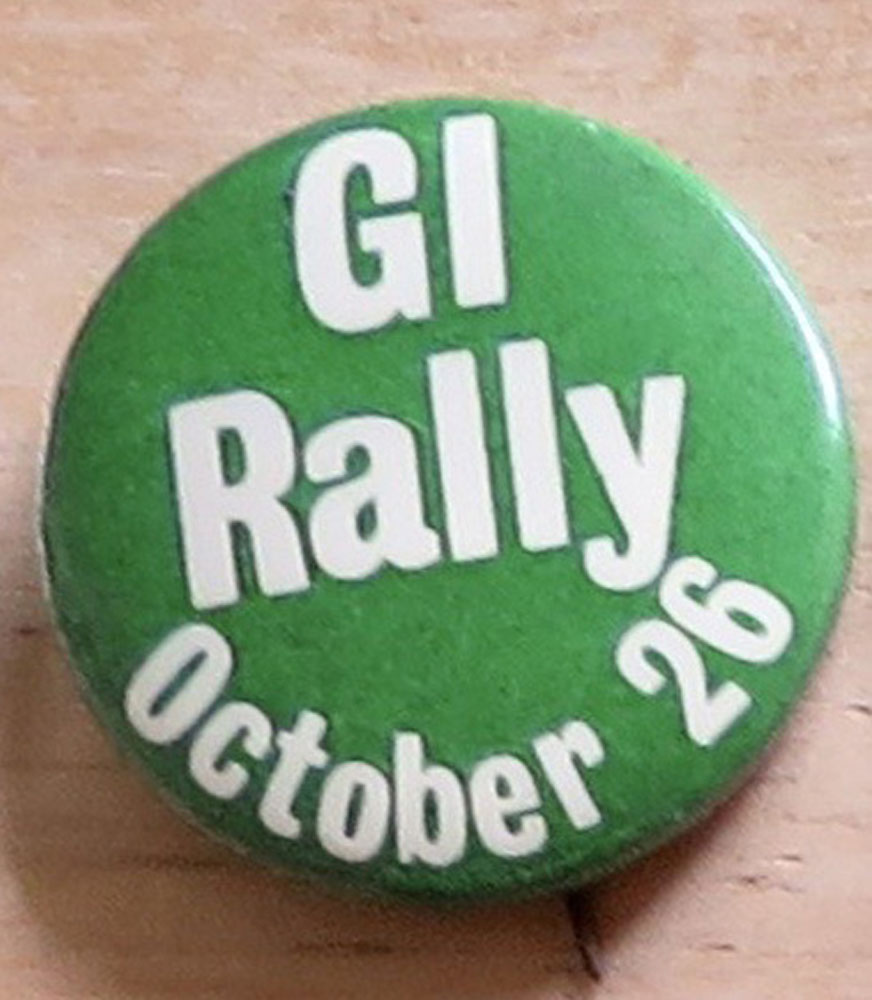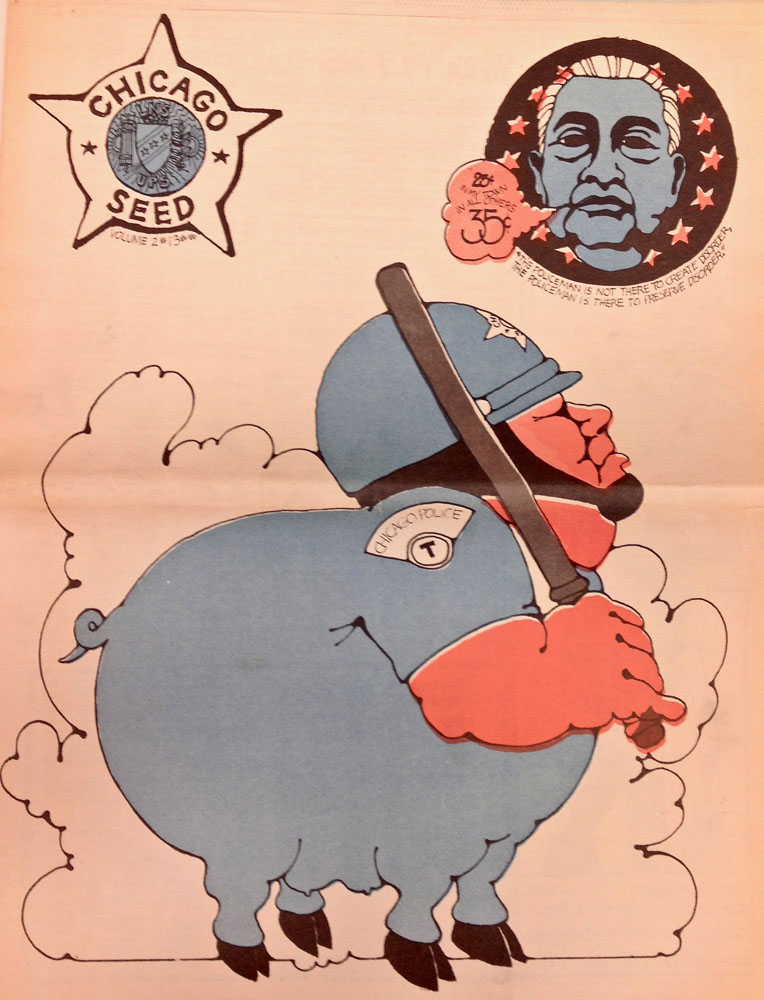 |
My 1968: Vietnam, RFK, the "Police Riot," and Nixon's ElectionBy Joe MillerFollowing the shocks of LBJ's decision not to run in '68 and Martin Luther King, Jr.'s assassination (and nationwide urban uprisings) in early spring, the April 27 demonstration in Chicago was the first post-Navy step into actual anti-war activity on my part. I would not call it 'radicalization,' since I was merely more liberal since I voted for Barry Goldwater in 1964 (that's a story for another time). Along with my Dad, I saw hope for ending the war in Robert F. Kennedy's campaign for the presidency, but I was also willing to engage in peaceful protest against the Vietnam War - which, in 1968, was still seen by too many as 'radical,' even 'treasonous.'
As I completed my first quarter of classes at Circle Campus in late May, things were heating up. The Democrats and anti-war liberals had Eugene McCarthy and Robert F. Kennedy to support, even though Humphrey had put his name into the mix in late April. The Republicans had Nixon. George Wallace was shaping up as the candidate for the white supremacist American Independence Party. On our campus, seven student organizations had been suspended for inviting a member of the Communist Party USA to speak on campus. While those suspensions were rescinded by the end of the quarter, there was already growing student interest in positions well to the left of the Democrats. I was curious and often bought the various periodicals these groups sold at their lit tables, but remained a supporter of RFK. I continued working the 11pm to 8am shift in the communications center at the Chicago Daily News. I maintained the teletype machines that brought in news from the UPI, AP, and City News Bureau, as well as our overseas reporters like Keyes Beech in South Vietnam. Since the Daily News was an afternoon paper, the overnight shift was usually quite busy. On this overnight, June 4-5, however, it went to extremes. Just after 2am Chicago time, we received the news that Kennedy beat McCarthy in the California primary. This meant he now had the lead in delegates to the upcoming convention. Within an hour, the news flash came in that Kennedy had been shot. All hell broke loose in the city room. I was trying to keep up with the incoming bulletins, while thinking, "I need to call Dad." Finally, I got to a phone and told him the news. All he said was "Oh, shit!" and he hung up. Kennedy died early the next day, June 6. My sister claims that, while sitting with her on the front steps that afternoon, I took off the peace medallion I usually wore and broke it in two. I do not recall this, but I would not be surprised. This changed everything for me. Events were pushing me to the left, it seemed. The death toll for Americans in Vietnam in May alone was 2,500. Perhaps naively, I believed that Kennedy was serious about ending the war. I did not believe anyone else could or would do it. It was now clear to many that Humphrey would get the nomination at the convention in August. But, the Yippies were coming! There would be a Festival of Life in Chicago! Yay! Since 1965, I had been reading a wide range of books and magazines. In fact, even while in the Navy, I had subscriptions to Ramparts, The Village Voice, San Francisco Oracle, East Village Other, and The Chicago Seed (the latter few from 1967 onwards). I was intrigued by the so-called "counterculture" because it seemed to offer new ways of thinking about human relationships and issues of war and peace. Now, in mid-1968, all this seemed more relevant. To be sure, I was no "hippie," as I was still primarily into political change. Also, the fact that the underground press was tweaking the nose of the "establishment" was entertaining. The "politicos" like Tom Hayden and Rennie Davis, along with the great pacifist Dave Dellinger, were calling people to come to Chicago to demand the end of the war. As the summer went on, it certainly looked like a confrontation was brewing. Daley unleashed the Chicago police back in April. You could only assume there would be little restraint on them during this Democratic circus in August. There are many good sources on these events. I was not in the streets. With a family and a full-time night job, my "experiences" were from afar. For example, driving to work on Monday and Tuesday nights, when remnants of the tear gas used in Lincoln Park came wafting across the Kennedy Expressway. Not in full force, mind you, but just enough to take me back to boot camp days. Then, on Wednesday night, I was working when some of the Daily News reporters and photographers who had been attacked by the police came back to the City Room. I recall photographer Paul Sequeira showing up with his broken hand after cops attacked him for doing his job. The "police riot" carried out its duty; it showed how painful it could be to exercise one's constitutional rights in a "democratic" society. Daily News columnist Mike Royko and Sun-Times cartoonist Bill Mauldin were scathing in their indictments of Daley and the cops during this week. The word came down to the City Room from the publisher Marshall Field IV for both papers to ease off on their critical articles about Daley and the police. Royko and Mauldin both threatened to resign publicly if any of their work was pulled from the papers. They had the clout that younger reporters did not have. [Later in the year, many of these younger reporters would establish the Chicago Journalism Review]. Oh, and Humphrey got the nomination, even though he did not win a single primary. One month later, on September 28, my wife and I joined ten to twenty thousand people in a march to Grant Park to show Daley and the police that we would not give up our rights to protest in a "gestapo state." On October 26 we attended a "GI Rally" at some Loop hotel. We heard a GI resister, Howard Petrick speak, followed by Mike Klonsky of SDS. When Klonsky came to the microphone, he said: "We are moving from this [flashing the peace sign] to this [raising his fist in defiance]." It was clear that this year had been a watershed for the anti-war and social justice movements. Personally, I was still in motion. Politically, where did I fit in? The question remained: who would I vote for in November? Humphrey would obviously be limited in his policy toward the war while LBJ was still around. Nixon had a "secret plan," but no one could really trust him since he was there at the very beginning of the war. Some on the fringes were calling for a vote for George Wallace, which would show the country how bad things could get—then, The Revolution. Ultimately, I decided to write-in Dick Gregory, the Illinois Peace and Freedom Party candidate, since PFP was not on the ballot. It was a gesture. Did such gestures cause the election of Nixon and the continuation of the war for another seven years? He got 47% of the vote and Humphrey got 44%. So, who could really say? My Dad, a longtime union Democrat, voted for Nixon. What a year that was! Joe Miller is a Navy veteran, 1961-68. Naval Security Group, 1961-64. USS Ticonderoga (CVA14), 1964-66. HELTRARON 8, 1966-68. He is a VVAW National Board Member.
|



